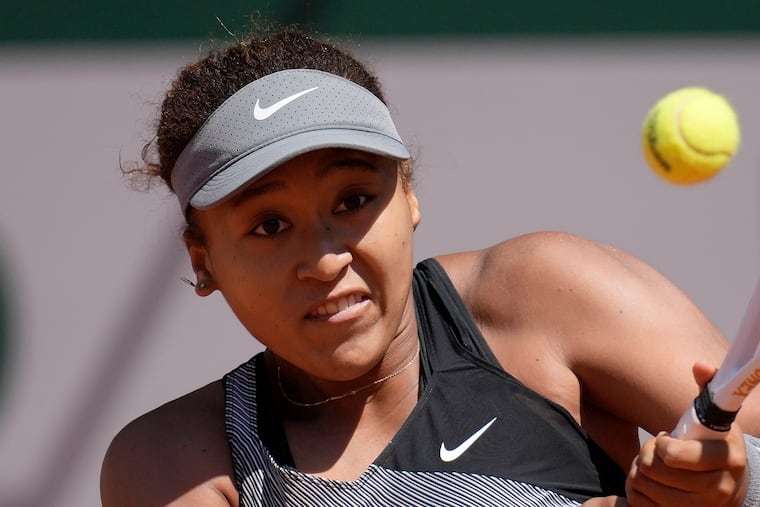Naomi Osaka did what many women of color have to do: Choose themselves, at a cost | Helen Ubiñas
Women of color are often punished for prioritizing their sanity and safety by setting boundaries with the very people and institutions that cause harm.

Naomi Osaka dumped the press and the French Open. And just as the spurned often do, neither dealt well with it at first.
Or had any clue about what it takes for a woman of color to prioritize her sanity and safety, or how often they’re professionally punished for setting boundaries by the very people and institutions inflicting the pain, or co-signing it through complicity.
That’s not hyperbole, especially for Osaka. She was fined $15,000 and threatened with more sanctions for skipping the news conference after her first-round victory.
In a statement, Osaka, 23, revealed that she has experienced depression and anxiety since winning her first major at the 2018 U.S. Open, where she was booed at the trophy ceremony after beating Serena Williams.
“I never wanted to be a distraction and I accept that my timing was not ideal and my message could have been clearer,” she said in her statement this week.
After her withdrawal, Gilles Moretton, the president of the French Tennis Federation, read a brief and belatedly supportive statement to the media — but did not take any follow-up questions, because why would a grown man be held to the same standards as a young woman, after all?
I’ll be honest here. I don’t know much about tennis, or sports reporting in general. They both strike me as grueling.
But I am a proud member of the media, on most days, and I will never blindly support less access because inevitably it will be exploited by unscrupulous public officials refusing to be held accountable for decisions that affect, you know, real life. (Which is why after watching some of the post-game news conferences, I’m convinced we would have had a very different last four years if we had an exchange program between some of these relentless sports reporters and the rubber-spined White House press corps.)
» READ MORE: Philly-area therapists explain why Naomi Osaka’s actions are significant for young women of color
I am, however, also a woman, of color — Puerto Rican, to be exact. And I have been in many spaces past, present, and undoubtedly future, where my health and well-being were diminished and devalued. And where my attempts at setting boundaries (mine look a lot like calling out BS) were either ignored or eventually written off as some aggressive affront — “But why is she so angry!?” — while simultaneously portrayed as being thin-skinned.
The word eventually is doing a lot of work in that paragraph because women of color usually have to do a lot of work to eventually, if they’re lucky, be heard. And then, laughably, only long enough to be asked to do the invisible work of educating others into being better and doing better. Maybe. One day.
Because make no mistake, that’s what Osaka has long been trying to do.
There is a heartbreaking video going around on social media of a despondent-sounding Osaka at a news conference at Indian Wells in 2018 — the same tournament that Serena and Venus Williams boycotted after claims of racism.
“Yesterday I just woke up and I was really depressed, but I don’t know why. … I was able to win two matches, but I feel like that really doesn’t say I can play well on clay. It’s more, I think, I’m just an OK player that was able to play OK. Like, I’m so sad right now.”
She was telling her truth, years ago, but here we are.
And while the word quit keeps getting bandied about in headlines and discussions — “Naomi Osaka Quits! — that’s just not accurate.
Osaka didn’t quit. She chose herself. She prioritized herself in a way that society has told and shown her and women who look like her it just won’t.
So they have to do it themselves.
“We fight to be acknowledged by a discourse that has been hardwired to ignore us, a system that has yet to acknowledge us as human,” said Samantha Rucker, a licensed psychotherapist and intuitive healer who works in private practice and with the Therapy Center of Philadelphia.
“I am tempted to be outraged by the news of Naomi Osaka withdrawing from the French Open,” she told me when I admitted to giving into this very temptation.
“I am tempted to lean into the narrative that no matter what, we will not be prioritized or taken seriously when it comes to our health, particularly our mental health. Then, I think about how she chose to center her experience. [She] chose to remove herself from the gaze of those who attempted to exert control over her. She created her own rules despite the social and professional implications.”
That, Rucker pointed out, is what “empowerment looks like.”
As hard and costly as these courageous acts are, “it is an act of love and liberation.”